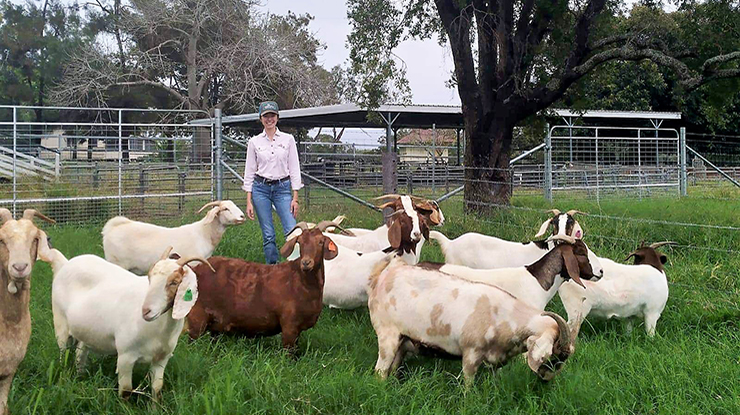 Kathryn Dawson, a PhD candidate at the University of Queensland’s School of Agriculture and Food Science is leading the project.
Kathryn Dawson, a PhD candidate at the University of Queensland’s School of Agriculture and Food Science is leading the project.
Producers sought for goat parasite research
Goat producers in south east and south west Queensland and northern New South Wales are being sought to participate in a new goat parasite research project, funded by the University of Queensland.
Kathryn Dawson, a PhD candidate at the University of Queensland’s School of Agriculture and Food Science is leading the project, investigating what parasites are present in those regions and the efficacy of a range of drenches.
“We will be particularly focusing on gastrointestinal nematodes which are the most prevalent pathogenic parasites,” Ms Dawson said.
“We will be assessing the efficacy of a range of drenches that are available for goat producers, and they will be a combination of registered goat and ‘off-label’ sheep products, accessible through vet prescription.
“We have identified 10 products we are wanting to test on different properties. That will allow us to map out resistance which there is very little data on for goats, especially in Queensland.”
Ms Dawson said there is no cost for producers to participate in the research project.
“We will talk them through the whole project, so they understand what is happening, and all the information we collect will be given to the participating producers, so they will know exactly what parasites are on their property and what products we test that are effective against those nematodes,” Ms Dawson said.
“We’re looking for producers running intensive, semi-extensive and extensive systems, preferably with meat goats, and either Boer or rangeland goats.
“It also doesn’t matter if they have crossbred goats as we want to sample their F1s, F2s and F3s.
“Ideally, we would be looking for 150 goats per property as that allows us to test 15 goats per 10 drench groups. They can be any age or sex, as long as they haven’t been drenched for a couple of months prior to us starting the research on their properties.
“There is no cost to the producer for any of this. We just need to be able to access their property and their goats so we can collect faecal samples, administer drenches, and then collect samples 14 days after drenching.
“It will provide a foundation for participating producers to know what’s going on in their properties and which products they can use, but also for further research that will benefit the goat industry as a whole.”
Producers interested in participating in the project can contact Kathryn Dawson via email: k.dawson@uq.net.au



